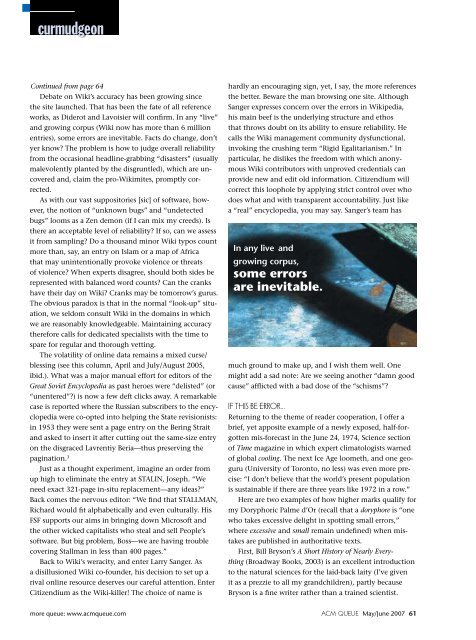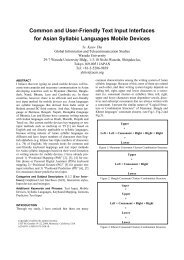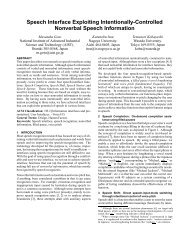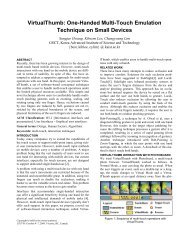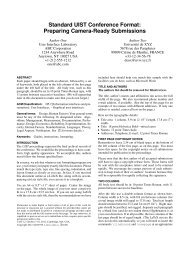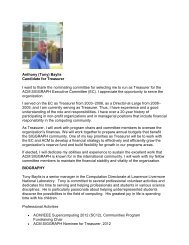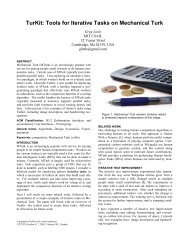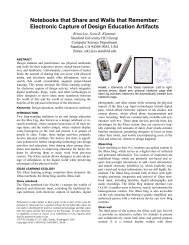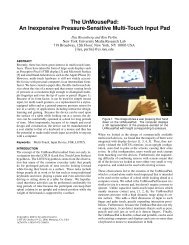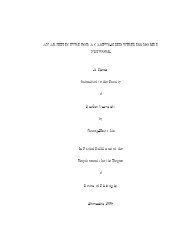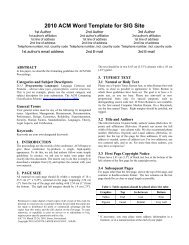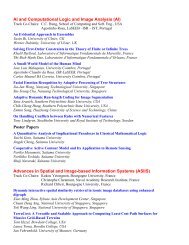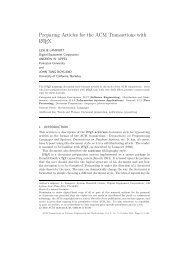API Design Matters Stonebraker and Seltzer - RabbitMQ
API Design Matters Stonebraker and Seltzer - RabbitMQ
API Design Matters Stonebraker and Seltzer - RabbitMQ
You also want an ePaper? Increase the reach of your titles
YUMPU automatically turns print PDFs into web optimized ePapers that Google loves.
curmudgeon<br />
Continued from page 64<br />
Debate on Wiki’s accuracy has been growing since<br />
the site launched. That has been the fate of all reference<br />
works, as Diderot <strong>and</strong> Lavoisier will confirm. In any “live”<br />
<strong>and</strong> growing corpus (Wiki now has more than 6 million<br />
entries), some errors are inevitable. Facts do change, don’t<br />
yer know? The problem is how to judge overall reliability<br />
from the occasional headline-grabbing “disasters” (usually<br />
malevolently planted by the disgruntled), which are un-<br />
covered <strong>and</strong>, claim the pro-Wikimites, promptly cor-<br />
rected.<br />
As with our vast suppositories [sic] of software, how-<br />
ever, the notion of “unknown bugs” <strong>and</strong> “undetected<br />
bugs” looms as a Zen demon (if I can mix my creeds). Is<br />
there an acceptable level of reliability? If so, can we assess<br />
it from sampling? Do a thous<strong>and</strong> minor Wiki typos count<br />
more than, say, an entry on Islam or a map of Africa<br />
that may unintentionally provoke violence or threats<br />
of violence? When experts disagree, should both sides be<br />
represented with balanced word counts? Can the cranks<br />
have their day on Wiki? Cranks may be tomorrow’s gurus.<br />
The obvious paradox is that in the normal “look-up” situation,<br />
we seldom consult Wiki in the domains in which<br />
we are reasonably knowledgeable. Maintaining accuracy<br />
therefore calls for dedicated specialists with the time to<br />
spare for regular <strong>and</strong> thorough vetting.<br />
The volatility of online data remains a mixed curse/<br />
blessing (see this column, April <strong>and</strong> July/August 2005,<br />
ibid.). What was a major manual effort for editors of the<br />
Great Soviet Encyclopedia as past heroes were “delisted” (or<br />
“unentered”?) is now a few deft clicks away. A remarkable<br />
case is reported where the Russian subscribers to the encyclopedia<br />
were co-opted into helping the State revisionists:<br />
in 1953 they were sent a page entry on the Bering Strait<br />
<strong>and</strong> asked to insert it after cutting out the same-size entry<br />
on the disgraced Lavrentiy Beria—thus preserving the<br />
pagination. 3<br />
Just as a thought experiment, imagine an order from<br />
up high to eliminate the entry at STALIN, Joseph. “We<br />
need exact 321-page in-situ replacement—any ideas?”<br />
Back comes the nervous editor: “We find that STALLMAN,<br />
Richard would fit alphabetically <strong>and</strong> even culturally. His<br />
FSF supports our aims in bringing down Microsoft <strong>and</strong><br />
the other wicked capitalists who steal <strong>and</strong> sell People’s<br />
software. But big problem, Boss—we are having trouble<br />
covering Stallman in less than 400 pages.”<br />
Back to Wiki’s weracity, <strong>and</strong> enter Larry Sanger. As<br />
a disillusioned Wiki co-founder, his decision to set up a<br />
rival online resource deserves our careful attention. Enter<br />
Citizendium as the Wiki-killer! The choice of name is<br />
more queue: www.acmqueue.com<br />
hardly an encouraging sign, yet, I say, the more references<br />
the better. Beware the man browsing one site. Although<br />
Sanger expresses concern over the errors in Wikipedia,<br />
his main beef is the underlying structure <strong>and</strong> ethos<br />
that throws doubt on its ability to ensure reliability. He<br />
calls the Wiki management community dysfunctional,<br />
invoking the crushing term “Rigid Egalitarianism.” In<br />
particular, he dislikes the freedom with which anonymous<br />
Wiki contributors with unproved credentials can<br />
provide new <strong>and</strong> edit old information. Citizendium will<br />
correct this loophole by applying strict control over who<br />
does what <strong>and</strong> with transparent accountability. Just like<br />
a “real” encyclopedia, you may say. Sanger’s team has<br />
in any live <strong>and</strong><br />
growing corpus,<br />
some errors<br />
are inevitable.<br />
much ground to make up, <strong>and</strong> I wish them well. One<br />
might add a sad note: Are we seeing another “damn good<br />
cause” afflicted with a bad dose of the “schisms”?<br />
If ThIs BE Error...<br />
Returning to the theme of reader cooperation, I offer a<br />
brief, yet apposite example of a newly exposed, half-forgotten<br />
mis-forecast in the June 24, 1974, Science section<br />
of Time magazine in which expert climatologists warned<br />
of global cooling. The next Ice Age loometh, <strong>and</strong> one geoguru<br />
(University of Toronto, no less) was even more precise:<br />
“I don’t believe that the world’s present population<br />
is sustainable if there are three years like 1972 in a row.”<br />
Here are two examples of how higher marks qualify for<br />
my Doryphoric Palme d’Or (recall that a doryphore is “one<br />
who takes excessive delight in spotting small errors,”<br />
where excessive <strong>and</strong> small remain undefined) when mistakes<br />
are published in authoritative texts.<br />
First, Bill Bryson’s A Short History of Nearly Everything<br />
(Broadway Books, 2003) is an excellent introduction<br />
to the natural sciences for the laid-back laity (I’ve given<br />
it as a prezzie to all my gr<strong>and</strong>children), partly because<br />
Bryson is a fine writer rather than a trained scientist.<br />
ACM QUEUE May/June 2007 61


